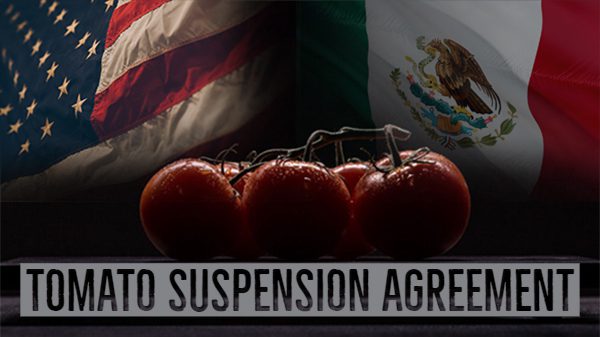MAITLAND, FL – October 2, 2023: Last week, the Fresh Produce Association of the Americas (FPAA) BB #:144354, which represents importers of Mexican tomatoes, used a misleading study to distract from Mexico’s record of dumping tomatoes.
The study claims that tomato prices will rise by an average of 52% if antidumping duties are imposed on imports of Mexican tomatoes.
This conclusion, however, is based on fantasy and not on market realities. The study completely discredits itself on its first page when the author reveals that this prediction is based on a “complete removal of Mexican imports from the U.S. market.”
There is no circumstance that would lead to the complete removal of Mexican tomato imports from the U.S. market. That’s not how the antidumping law works and that’s not what American tomato growers are seeking. The FPAA and its members know this. Their goal is to create panic among tomato buyers and consumers with the hope that such a panic will cover up Mexico’s record of injuring American tomato growers by dumping tomatoes in the U.S. market.
The study tries to reclaim some credibility by also considering the possibility of a smaller reduction in Mexican imports. It claims a more modest price increase of 13% would occur, on average, if antidumping duties result in a 25% reduction to Mexican imports. Even this is a baseless overreach.
For example, U.S. import data collected by the U.S. International Trade Commission shows that from May to September 2019, a period when antidumping duties on Mexican tomatoes were in effect, imports dropped by only 6% as compared to the same period in 2018, demonstrating that even the hypothetical 25% decrease is unsupported by market realities.
The study also fails to consider the capability of American tomato growers to cover market disruptions should they actually occur.
“Termination of the Tomato Suspension Agreement, and the imposition of antidumping duties, will not put any restrictions on the volume of Mexican tomatoes permitted to enter the United States,” explains Michael Schadler, Executive Vice President of the Florida Tomato Exchange BB #:162441. “Rather, it will only ensure that Mexican tomatoes are sold at fair prices, in accordance with U.S. and international law, as well as the USMCA.”
Widespread National Support for Terminating Suspension Agreement:
Schadler also noted: “In recognition of the serious problems facing American fruit and vegetable growers due to unfair Mexican trade practices, there is strong support in the U.S. agricultural community for terminating the Tomato Suspension Agreement and imposing antidumping duties.”
Over 100 American tomato growers from 13 states have called on the Commerce Department to terminate the Suspension Agreement. This includes tomato growers from Alabama, Arkansas, California, Florida, Georgia, Iowa, Michigan, Minnesota, New Jersey, North Carolina, Pennsylvania, South Carolina, and Tennessee.
Their call to the Commerce Department was joined by the American Farm Bureau and state farm bureaus from Arkansas, California, Florida, Georgia, Michigan, New Jersey, North Carolina, South Carolina, and Tennessee, as well as fruit and vegetable grower associations from Alabama, Florida, Georgia, Michigan, and New Jersey.
This national support from the American agriculture community for terminating the Suspension Agreement and imposing antidumping duties was echoed by 59 members of Congress, led by Senator Marco Rubio (R-FL) and Congressman Jim Costa (D-CA), who wrote to Commerce Secretary Raimondo seeking termination of the agreement, stating: “Immediate termination of the 2019 Suspension Agreement and imposition of antidumping duties is necessary to stop the destruction of the American tomato industry by unfairly traded Mexican tomatoes. We urge you to take these actions without delay.”
Senator Jon Ossoff (D-GA) joined in the Congressional call for terminating the 2019 Suspension Agreement in his own letter to Secretary Raimondo, writing that “The U.S. International Trade Commission has determined that the domestic fresh tomato industry is materially injured by dumped Mexican tomatoes. Despite successive suspension agreements with Mexico, the volume of tomato imports continues to grow, forcing American producers out of the industry. Small family operations have been hit hard, causing harmful impacts to rural economies.”
Contact:
Michael Schadler
Executive Vice President
Florida Tomato Exchange
(407) 660-1949
michael@FloridaTomatoExchange.com



